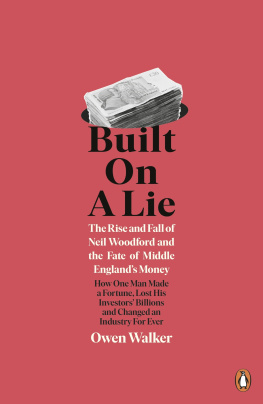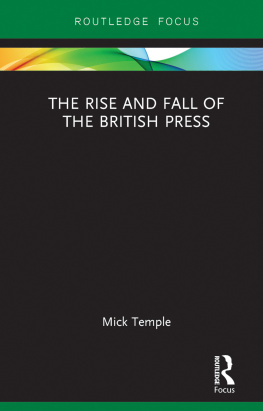By the same author
Barbarians in the Boardroom: Activist Investors and the Battle for Control of the Worlds Most Powerful Companies
Owen Walker
BUILT ON A LIE
The Rise and Fall of Neil Woodford and the Fate of Middle Englands Money

PENGUIN BOOKS
UK | USA | Canada | Ireland | Australia
New Zealand | India | South Africa
Penguin Books is part of the Penguin Random House group of companies whose addresses can be found at global.penguinrandomhouse.com.

First published by Penguin Business in 2021
Copyright Owen Walker, 2021
The moral right of the author has been asserted
Cover photos Getty Images
ISBN: 978-0-241-46822-7
This ebook is copyright material and must not be copied, reproduced, transferred, distributed, leased, licensed or publicly performed or used in any way except as specifically permitted in writing by the publishers, as allowed under the terms and conditions under which it was purchased or as strictly permitted by applicable copyright law. Any unauthorized distribution or use of this text may be a direct infringement of the authors and publishers rights and those responsible may be liable in law accordingly.
For Sarah, Arthur and Albie

1
Made in Maidstone
From the Medway Rooms open window in the Grade II listed Sessions House, inmates from HM Prison Maidstone could be heard exercising in the yard outside. Grandly designed in the Greek Revival style, Sessions House had seen better days. The musty rooms were freezing in winter and sweltering in summer. It began life as a court in 1824, dispensing local justice and disposing convicted criminals into the jail next door. Kent County Council later moved into the imperious building and throughout its nearly two centuries as a civic centre it had been the setting for plenty of life-altering deliberations. On the morning of 16 November 2018, hundreds of millions of pounds were at stake.
The motley crew of councillors, local government staff, retired council workers and union officials gathered and nervously shuffled their meeting packs. Old books lined the walls, while black-and-white photos of mayors from years gone by looked down on the congregation. The smell of damp filled the air. While meetings of Kent County Councils Pension Fund Committee usually began with idle gossip about local politics and town hall affairs over weak coffee and cheap biscuits, on this occasion one topic dominated discussions. The fourteen committee members and four council officers present were about to decide whether to sack their favourite fund manager.
Neil Woodford was the most celebrated British investor of his generation. For more than three decades, the savers of Middle England had entrusted him with their hard-earned nest eggs and he had made them rich with years of blockbuster returns. He was lauded in the press as much for his daring bets and bull-headed conviction as for his fleet of fast cars and his ostentatious mansions: the rock-star fund manager with a lifestyle to match. He not only was the biggest name in the investment industry but also held sway over Britains largest companies. In boardrooms up and down the country his fierce temper and strong-arm approach to getting his own way were the stuff of nightmares.
But things had not been going his way of late. It had been a shocking eighteen months for Woodfords business, with his investment portfolios pummelled by the collapse of some of the companies he had backed the hardest. Among the businesses Woodford had helped prop up with Kents retirement savings were the AA, Provident Financial and Capita, all of which had been hobbled by individual problems. Meanwhile, many of the other companies in his fund were suffering from the malaise in Britains economy brought on by uncertainty over the direction of Brexit negotiations. His fund had lost nearly 17 per cent that year and other clients were giving up on him. Kents pension board summoned him to their November meeting to explain his dire performance.
Yet, as Woodford strutted into the Medway Room, accompanied by his top salesman, Will Deer, he was far from repentant. With a broad chest, thick neck and close-cropped white hair, Woodford had the swagger of a bulldog as he burst through the doors. A natural sportsman and an amateur rugby player in his youth, Woodford was still a fitness fanatic. The cocky investor had abandoned his preferred getup of a tight-fitting black sweatshirt and jeans which gave him the appearance of a menacing nightclub bouncer in favour of a blue suit, crisp white shirt and burgundy tie. But the famous fund manager showed no sign of discomfort. If anything, he was in his element. There was nothing Woodford liked better than being put through his paces on his knowledge of the companies he had invested in and his predictions for the markets and economy. With no attempt at small talk, Woodford got straight down to business.
In unscripted comments, delivered in his trademark down-to-earth style, Woodford gave a spirited defence of his investment record. Displaying supreme confidence in his own ability to pick companies, Woodford was unflinchingly supportive of the businesses he had poured money into. He insisted that, despite their recent blow-ups, they would eventually come good. He had had periods of severe underperformance at several points in his career, he conceded, but always emerged stronger for them. All Kent needed to do was stick by him and their patience and loyalty would be rewarded. Members of the board quizzed Woodford on his expectations for Brexit and how the portfolio would respond. Again, Woodford was bullish, insisting that once Britain left the EU, money would flow into UK companies from overseas and his fund would rebound. He was dismissive when asked about the scale of the withdrawals from the fund, hubristically insisting that those who left early would regret doing so when it bounced back.
The cocksure performance worked. Kents trustees were persuaded that Woodford was suffering a short-term blip, and that as soon as the UK left the EU an event scheduled for the following March confidence would return to the markets and Woodfords fund would surge. The investor was given a reprieve. Perhaps against their better judgement, Kents trustees continued to support Woodford a decision they would later bitterly regret.
What was so concerning for the Kent trustees was that they had 263 million tied up in Woodfords fund. This was money they had handed over to the investment guru that was meant to pay the retirement benefits of the more than 135,000 street sweepers, librarians and local government workers who were members of the scheme. The more fellow investors in the fund asked for their money back, the harder it would be for Kent to get its cash out. Just like with runs on a bank, when lenders are in distress and account holders queue round the block to take out their savings, funds that allow investors to withdraw their money daily are vulnerable when customers become skittish.
Kents pension board knew all too well about the perils of a bank run. Just over a decade earlier the council had handed 50 million of taxpayers money and retirement savings to three Icelandic lenders, seduced by the promise of high interest rates on deposits. But when the banks Glitnir, Landsbanki and Heritable all buckled under the weight of the global financial crisis in 2008, those deposits were jeopardized. A damning report from the UK governments now defunct Audit Commission said Kent had been negligent over its Icelandic investments. It revealed how, even after the credit ratings of Glitnir and Landsbanki were downgraded below a level acceptable for local authorities to do business with them on 30 September of that year, Kent continued to hand over money. Kent made two deposits on 1 and 2 October totalling 8.3 million. Within a week the banks had collapsed, trapping Kents cash. The Audit Commission, which was set up to monitor public sector finances, found that the final deposit was made after council officials had received but failed to open an email warning them not to continue doing business with the struggling banks. It was an embarrassing revelation that showed up the councils finance department as incompetent.














